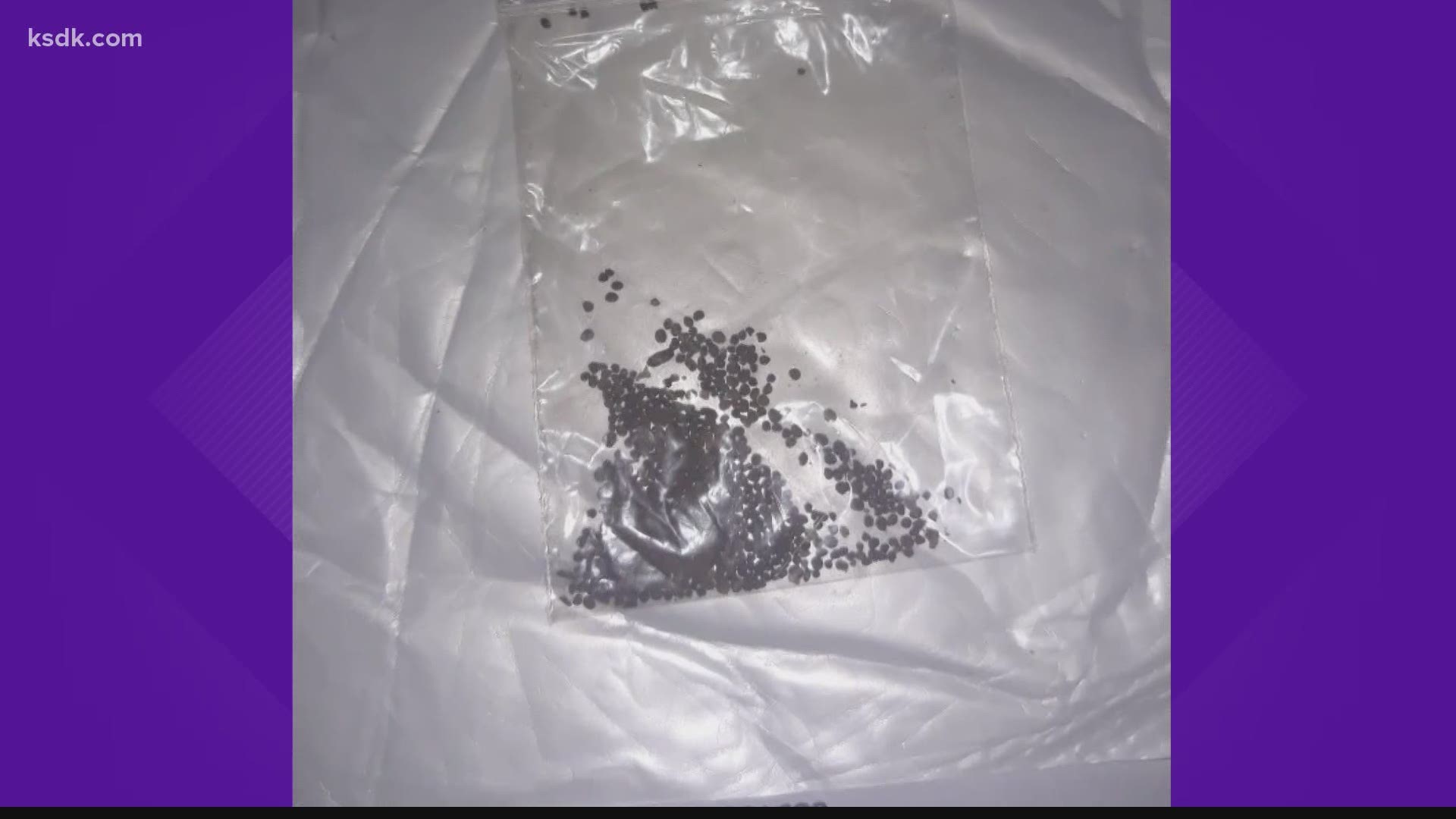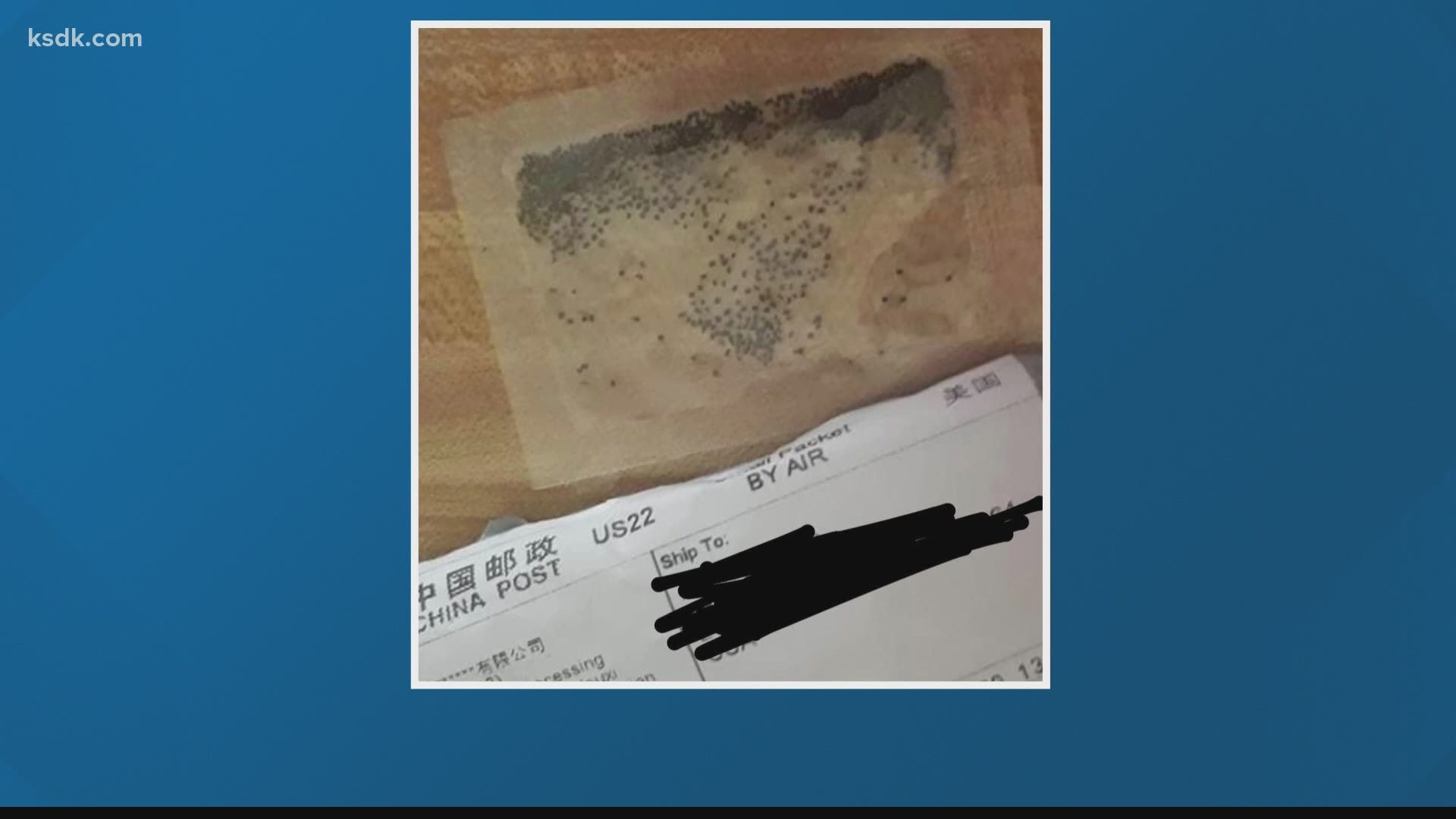ST. LOUIS — As if 2020 wasn't strange enough, now people in at least 30 states are finding random packages from China in their mailbox. Some contain seeds, others contain jewelry.
Some of the packages were labeled as jewelry and may have Chinese writing on them, according to agriculture officials.
The agriculture departments in 30 states have recently issued statements warning residents about the seeds: Alabama, Arkansas, Colorado, Delaware, Florida, Georgia, Iowa, Kansas, Kentucky, Louisiana, Maryland, Michigan, Minnesota, Mississippi, Montana, Nebraska, Nevada, New Hampshire, New Jersey, North Carolina, North Dakota, Oklahoma, Oregon, South Carolina, Tennessee, Texas, Virginia, West Virginia, Washington and Wyoming.
People in Utah, Arizona and Ohio have also reported receiving the mysterious packages, local news outlets reported.
The Missouri Department of Agriculture tells the I-Team they've received several hundred reports about unwanted seeds arriving in the mail.
“I was like, 'Well, I didn't order jewelry and I didn't order seeds',” said Christine Lieber of Sunset Hills.
Last week, Lieber received a package labeled "stud earrings". Inside, she found a baggie of tiny black seeds.
“So, I just threw them away not thinking anything of it,” said Lieber.
She told a friend about the strange seeds and they immediately sent her articles about people in other states who had received seeds under similar circumstances.
Lieber took advice from one of those articles, fished the seeds out of the garbage and reached out to the U.S Department of Agriculture.
“They wanted us to send the seeds in to just make sure it wasn't something detrimental to our agriculture,” said Lieber.
Still, questions linger: why would anyone bother to do this? And why seeds?
“We've also heard recently about ping pong balls being received and all of these could possibly be part of a brushing scam,” said Rebecca Phoenix with the Better Business Bureau.
Anatomy of a brushing scam
According to the BBB, a brushing scam is aimed at getting fake positive reviews onto platforms like Amazon and eBay. Fake reviews mean consumers are more likely to buy something and that means scammers make more money.
“A company or a third party will send something that's kind of lightweight to you so that they can create a verified purchase and that enables them to bypass some of the restrictions that shippers have in having reviews posted,” said Phoenix.
Once there's proof an item was shipped, the scammer can use your information to write a glowing review for whatever product they're selling.
They can also help inflate sellers' sales numbers.
“What they're after we think is just showing that something was shipped, not necessarily verifying what was in the in the package,” said Phoenix.
Personal information compromised
It may sound harmless, but scammers acquiring consumers' addresses in the first place is a cause for concern.
“If you are receiving one of these packages it could be a pretty good sign that your personal information is compromised. In some way someone has gotten your information in order to create these bogus accounts,” said Phoenix.
Lieber says she only orders online from Amazon.
“That would be something we'd need to look into with Amazon. I think it's a lot of trouble to go through if it's just a seller getting ratings,” said Lieber.
Good news and bad News
The good news is, consumers are legally entitled to keep whatever unordered merchandise does show up on their doorsteps.
The bad news: your information may be compromised. Time to start thinking about changing your account passwords and monitoring your credit report.
What can consumers do?
Notify Amazon. Brushing and fake reviews are against Amazon’s policies, so consumers can contact Amazon Customer Service if this happens. The department will investigate and take action on the bad actor. Go directly to Amazon’s website to get the contact information.
The company also takes security seriously and encourages customers to report fraudulent purchases or other security issues. If the preference is to contact customer service by phone, be cautious of searching for support phone numbers.
Change your account passwords. This may be a sign that personal information has been compromised and to improve account security, keep a close eye on credit reports and credit card bills.
What to do with the seeds
If consumers receive unsolicited seeds in the mail, contact the Missouri Department of Agriculture or the state plant health office.
If Missouri residents have received unsolicited seeds, the following guidance from the department of agriculture applies:
- Do not open the seed package.
- Do not plant the seeds if you have opened the package.
- Submit an online report to the USDA verifying you have received unsolicited seeds.
- Do not dispose of the seeds, packages or envelopes until USDA provides further guidance.


